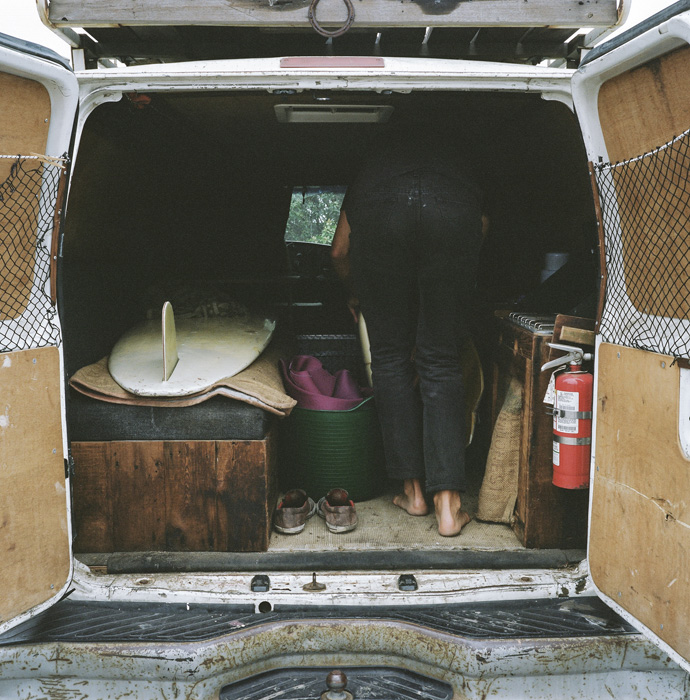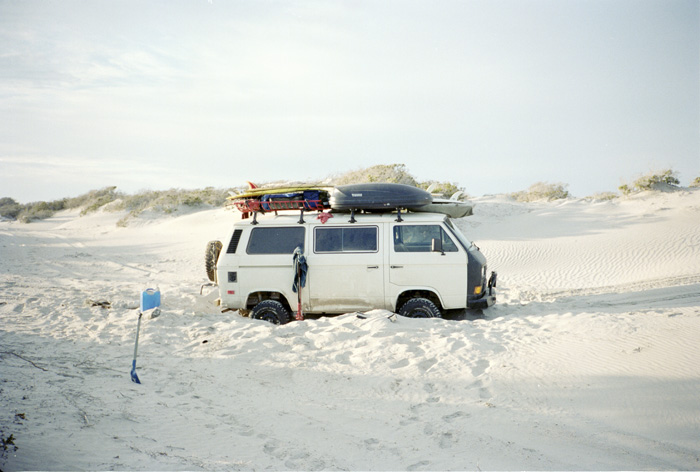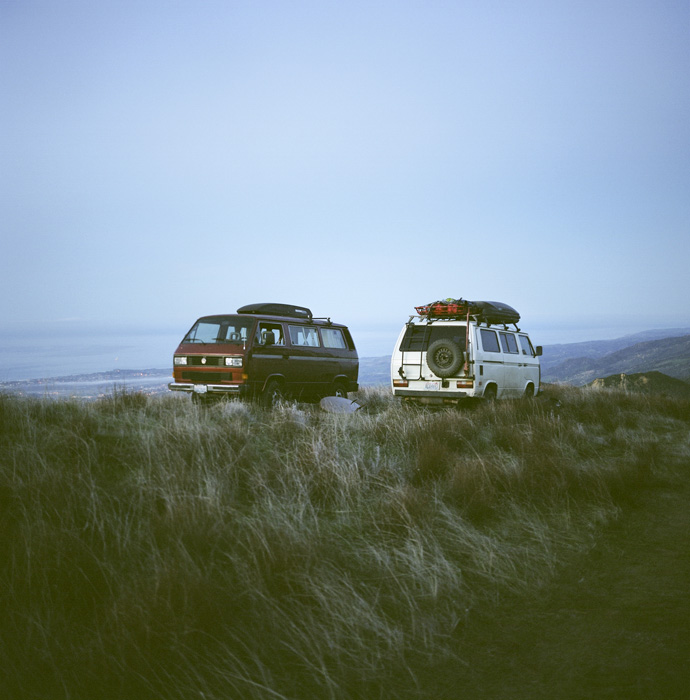Last week, I took my 1998 Dodge Conversion van, a.k.a. Ms. Ramsey, to the auto shop not realizing that it would be one of the last times I got to drive it. As the mechanic explained how fucked my transmission is, I remembered a similiar experience in my youth when I had to put my dog down. The mechanic sensed how attached I was to the van and started coaching me through the loss. That van had allowed me to explore so many parts of the Northeast that I would have never seen without it. Because I was so bummed about my van problems I decided to catch up with another fan of vans and infamous #Vanlife creator Foster Huntington. We talked about surfing, traveling, and van-heartbreak.
Advertisement
After quitting his New York-based design job a couple years ago, Foster has been able to live on his own terms out of a couple different vehicles, documenting it as he goes on a number of different popular blogs. He’s traversed many parts of the country surfing, fly-fishing, and camping, and is now finishing his second photo book, Home Is Where You Park It. Check out some unseen outtakes above, and check out our conversation below. Clearly, we have a few things in common.VICE: Now that you’ve reached your Kickstarter goal for the book—congrats, by the way—what are the next steps toward making the final product?
Foster Huntington: I shot it all on film, so I have to go scan all the negatives. Then I’m working with these designers from New York. They’re going to lay it out. I’m actually going to go back to New York for the first time since I left in July of 2011 and work on it for about a week. Then I’ll come back and hang out in the Northwest and Northern California to surf through the fall. Then I think I might go on a surf trip to Morocco in December.Awesome. I traveled through Morocco myself but didn’t surf at all.
Yeah, it’s really fucking good! It’s like the Baja of Europe. It’s not super busy like Europe; it’s still rough around the edges, so it has less tourists than a lot of places, but it’s supposed to have really great waves. What’s up with you? You’re from Nebraska and you surf?
Foster Huntington: I shot it all on film, so I have to go scan all the negatives. Then I’m working with these designers from New York. They’re going to lay it out. I’m actually going to go back to New York for the first time since I left in July of 2011 and work on it for about a week. Then I’ll come back and hang out in the Northwest and Northern California to surf through the fall. Then I think I might go on a surf trip to Morocco in December.Awesome. I traveled through Morocco myself but didn’t surf at all.
Yeah, it’s really fucking good! It’s like the Baja of Europe. It’s not super busy like Europe; it’s still rough around the edges, so it has less tourists than a lot of places, but it’s supposed to have really great waves. What’s up with you? You’re from Nebraska and you surf?
Advertisement

Yeah I moved out to New York three years ago and started then. I always get the funniest looks from people with my license plates. My buddies and I take tons of small surfing trips around Long Island.
You’ve got to make it up to Maine!Shit, I know man. I just ran into van troubles last week and am trying to figure out my next move. Have you been pretty lucky with your van, or have you run into many troubles?
This is a bummer, man! I had 1987 Volkswagen Vanagon, Syncro, and I bought it without seeing it. When I was in New York I got super excited about Syncros, which are four-wheel-drive vans. I found it was for sale in the middle of nowhere in Nevada. I flew out and it was literally at one of the most remote places in North America. The previous owner drove five hours to come meet me, and I told him I’d buy it. He was the original owner and when I got the van, the body already had 292,000 miles on it. The engine wasn’t as hammered, and I put on 60,000 miles after that and it was a constant battle. Those vans are so cool, but they cost a fortune to maintain. I was spending about $2,500 a month on maintenance work.It’s no joke.
I got sick and tired of dealing with that. It was the kind of thing where I was driving to some place and it would break down, and then I just had to stay in that spot for a week or so and wait for parts to arrive and hope it wasn’t something major. At any given moment I’d run into problems that would cost upward of $6,000 to repair. It was totally financially unsettling. So, I ended up getting rid of it and got a camper attached to a Toyota Tacoma body. It’s super reliable and incredibly functional. It’s not as cool as a VW van by any means, but in terms of getting from place to place and going to Mexico, it’s super ideal.
You’ve got to make it up to Maine!Shit, I know man. I just ran into van troubles last week and am trying to figure out my next move. Have you been pretty lucky with your van, or have you run into many troubles?
This is a bummer, man! I had 1987 Volkswagen Vanagon, Syncro, and I bought it without seeing it. When I was in New York I got super excited about Syncros, which are four-wheel-drive vans. I found it was for sale in the middle of nowhere in Nevada. I flew out and it was literally at one of the most remote places in North America. The previous owner drove five hours to come meet me, and I told him I’d buy it. He was the original owner and when I got the van, the body already had 292,000 miles on it. The engine wasn’t as hammered, and I put on 60,000 miles after that and it was a constant battle. Those vans are so cool, but they cost a fortune to maintain. I was spending about $2,500 a month on maintenance work.It’s no joke.
I got sick and tired of dealing with that. It was the kind of thing where I was driving to some place and it would break down, and then I just had to stay in that spot for a week or so and wait for parts to arrive and hope it wasn’t something major. At any given moment I’d run into problems that would cost upward of $6,000 to repair. It was totally financially unsettling. So, I ended up getting rid of it and got a camper attached to a Toyota Tacoma body. It’s super reliable and incredibly functional. It’s not as cool as a VW van by any means, but in terms of getting from place to place and going to Mexico, it’s super ideal.
Advertisement
I’m thinking my next route will be something like that. I’ll probably sacrifice a bit of comfort for something more reliable.
It’s worth it because at the end of the day, you can get so caught up having this vehicle that is super cool, but if it breaks down and it’s costing you a lot of money, you’re just not going to use it. It’s one thing when you have a car and it breaks down; it’s another thing when it’s also your house. Your entire existence ceases to be for a little while.
It’s worth it because at the end of the day, you can get so caught up having this vehicle that is super cool, but if it breaks down and it’s costing you a lot of money, you’re just not going to use it. It’s one thing when you have a car and it breaks down; it’s another thing when it’s also your house. Your entire existence ceases to be for a little while.

It’s great to talk to you about this because you can commiserate. Did you study photography?
No, I went to a small liberal-arts college in Maine called Colby College. I had no clue what I wanted to do and just applied to schools and I had never been to Maine before. Colby let me in, and I decided to pursue it sight unseen. I got there and was not prepared to deal with the world of entrenched wealth that is New England and prep schools. It boggled my mind. I was pretty bored so I started taking photos when I was a junior and then also started my blog, A Restless Transplant. I just started posting photos of my buddies and I going on surf trips in Maine or going camping and doing stuff like that. Then, a designer from Ralph Lauren saw my blog and got in touch with me and asked me if I’d though about working in design or another related field. I told him I hadn’t, but it sounded intriguing. This was in 2009, and at the time the outlook of doing something creative right out of college seemed minimal. Opportunities like that don’t come around all that often, so I went down there and met some people from Polo. I interned there for a summer and it led to a job. My specialty was finding photographs from various sources and putting them together to create small narratives. Everyone there was very visually talented, so most of what I learned came from working with guys who had really good taste in photography.
No, I went to a small liberal-arts college in Maine called Colby College. I had no clue what I wanted to do and just applied to schools and I had never been to Maine before. Colby let me in, and I decided to pursue it sight unseen. I got there and was not prepared to deal with the world of entrenched wealth that is New England and prep schools. It boggled my mind. I was pretty bored so I started taking photos when I was a junior and then also started my blog, A Restless Transplant. I just started posting photos of my buddies and I going on surf trips in Maine or going camping and doing stuff like that. Then, a designer from Ralph Lauren saw my blog and got in touch with me and asked me if I’d though about working in design or another related field. I told him I hadn’t, but it sounded intriguing. This was in 2009, and at the time the outlook of doing something creative right out of college seemed minimal. Opportunities like that don’t come around all that often, so I went down there and met some people from Polo. I interned there for a summer and it led to a job. My specialty was finding photographs from various sources and putting them together to create small narratives. Everyone there was very visually talented, so most of what I learned came from working with guys who had really good taste in photography.
Advertisement
Right on. That’s cool.
Yeah, but then I got turned off of working in fashion and designing things for rich dudes in Connecticut. Slowly, I got more interested in minimalism and a Japanese design philosophy called wabi-sabi. It’s all about embracing imperfection and form follows function. I started to realize that I was blowing it, the things I was making were not rad, and I shouldn’t be inside an office building working 70 hours a week in my early 20s for some big-ass corporation. So, then I started a photo blog called the Burning House and asked people to submit photos of what they would save if their house were burning down. My initial idea for it was to get people to really think about stuff that was actually important to them and then they would probably realize they needed a lot less stuff. That took off quickly, and I was approached by Harper Collins to turn it into a book. I took all of the advance money from the book and bought that van and hit the road.
Yeah, but then I got turned off of working in fashion and designing things for rich dudes in Connecticut. Slowly, I got more interested in minimalism and a Japanese design philosophy called wabi-sabi. It’s all about embracing imperfection and form follows function. I started to realize that I was blowing it, the things I was making were not rad, and I shouldn’t be inside an office building working 70 hours a week in my early 20s for some big-ass corporation. So, then I started a photo blog called the Burning House and asked people to submit photos of what they would save if their house were burning down. My initial idea for it was to get people to really think about stuff that was actually important to them and then they would probably realize they needed a lot less stuff. That took off quickly, and I was approached by Harper Collins to turn it into a book. I took all of the advance money from the book and bought that van and hit the road.

How is your next book, Home Is Where You Park It, going to be different?
I wanted to do everything on my own terms. I wanted to have the creative control. From a creative standpoint, this one’s going to be photos of vans and anecdotes about people who live and travel in their vans. The philosophy is similar. I’d love to get people to think they don’t need a ton of shit to be happy and maybe see how rewarding living and traveling in a van can be. I think living, or at least spending some time, in a van is such a good way to get out and see the world without having to make hotel reservations and shit like that.
I wanted to do everything on my own terms. I wanted to have the creative control. From a creative standpoint, this one’s going to be photos of vans and anecdotes about people who live and travel in their vans. The philosophy is similar. I’d love to get people to think they don’t need a ton of shit to be happy and maybe see how rewarding living and traveling in a van can be. I think living, or at least spending some time, in a van is such a good way to get out and see the world without having to make hotel reservations and shit like that.
Advertisement